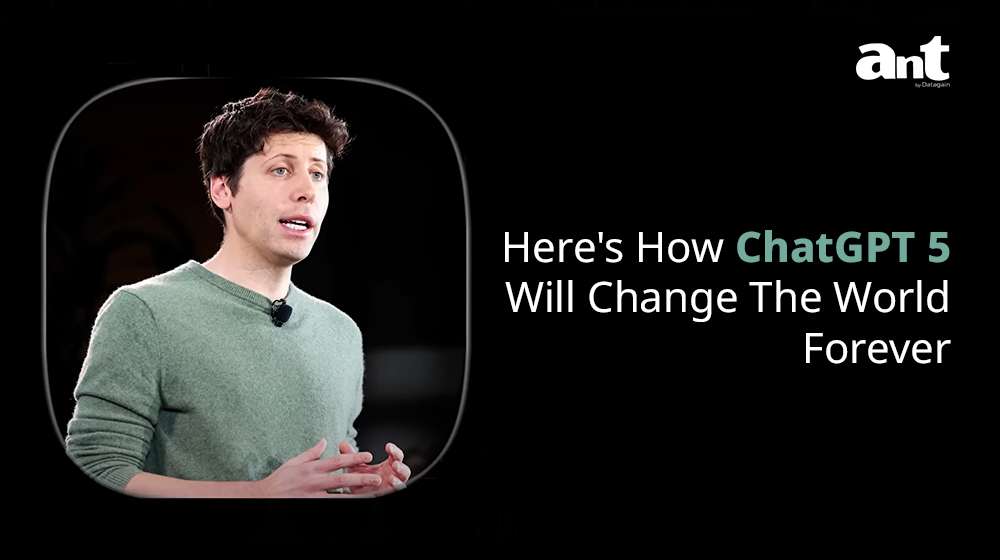
Home » Transcript Library » Here’s How ChatGPT 5 Will Change the World Forever
Here’s How ChatGPT 5 Will Change the World Forever
Sam Altman: I’m excited about being smarter. It’s going to be smarter. We multiply 200 medium-sized things together into one giant thing.
Speaker: The upcoming launch of GPT 5 is set to Mark a major Leap Forward in AI technology. It is anticipated to break new ground. GPT 5 promises to enhance performance and broaden the range of its applications changing how we interact with AI.
Sam Altman: This is a big thing, like, this is going to touch all of us. I expect that the Delta between 5 and 4 will be the same as between four and three.
Speaker: In this video, we’re diving into nine ways GPT 5 is expected to transform our world. Let’s start.
Number 1. Advanced Reasoning Capabilities. One of the anticipated advancements in GPT 5 is the enhancement of its reasoning capabilities, this means the AI will be able to think through information in a logical manner and draw conclusions that extend beyond what it already knows. Imagine it solving complex challenges, getting a lot better at figuring out puzzles, even ones they’ve never seen before. GPT 5 will be able to think make smart guesses and find answers to tough questions, it’s also going to be better at predicting what might happen next and giving more correct answers. The anticipated advancements in GPT 5 promise to elevate its intelligence and dependability making it an even more effective tool for users seeking smart accurate answers. Sam Altman in an interview mentioned that he had a conversation with Bill Gates about how GPT 5 will get good at figuring things out, just like a really smart person. They talked about the idea of the AI being able to think through problems in a smart way.
Sam highlighted how important it is for future versions of AI to keep getting better at this, so they can help us more. Right now GPT 4 is only able to think through problems in a very basic way and it’s not always reliable. Imagine if you asked GPT 4 the same question 10,000 times, you might get a really good answer once, but it’s hard for the AI to know which answer is the best every single time. Sam Alman talked about making GPT 5 much better at this. He wants it to be able to give you the best possible answer every time you ask something. This Improvement in reliability along with the ability to solve problems more intelligently means that GPT 5 is going to be a lot smarter and more helpful.
Number 2. Huge Context Window. Think of the context window in AI, like GPT 5, as the memory space it has available to remember what it has read or been told. Just like when you’re trying to understand a story, it helps if you can remember everything from the start rather than just bits and pieces. A longer context window means GPT 5 can keep more information in mind at once. This is important for understanding complex stuff, like a long email, a big chunk of computer code or a whole conversation. For GPT 5 there’s a buzz that it’s going to have an even bigger memory for this kind of thing. Current currently GPT 4 Turbo’s context window is at 128,000 tokens. Now GPT 5 might boost that number up to 200,000 words. With this bigger reading memory, GPT 5 can dive into much longer text or data, such as detailed discussions, full-length movies or large piles of computer code. It won’t just read them, it’ll understand them deeply enough to spot problems, suggest fixes or even analyze the storyline of a film. This leap in ability opens up new possibilities for how we use AI. Think about it, GPT 5 could help lawyers review long legal documents faster, assist programmers in debugging by looking at the entire program at once or help film analysts break down complex movie plots and themes. This expectation isn’t coming out of nowhere. Google’s Gemini made a big leap by massively increasing its own memory space up to 10 million pieces of information or tokens, it can consider it once. This move has stirred things up, influencing others in the field like open AI to push the boundaries further.
Number 3. User Personalization. Imagine if the AI could remember your favourite topics, how you like the information presented or even the jokes you find funny that’s what personalization is all about. It’s like having a chat with a friend who knows you well and understands just what you need or want to hear. GPT 5 is expected to take this to a new level, it could keep track of the things you tell it, like your hobbies, your work, or the kind of advice you seek, and then use that info to make its responses even more tailored to you. Whether you’re asking for a book recommendation or need help solving a problem GPT 5 could offer suggestions that feel like they’re coming from someone who gets you. This step towards more personalized AI doesn’t just mean it’ll remember your preferences; it’s about creating interactions that feel more natural and engaging. Sam Altman talks about pushing for this kind of customization in future versions of GPT. This means the AI won’t just be smarter in how it understands and generates text, it’ll also be better at adjusting its approach based on what it learns about you leading to a more customized and enjoyable experience.
Number 4. Multimodality. Multimodality is another upgrade we’re looking forward to in GPT 5. GPT 5 would understand and communicate through different types of data, not just text, but also speech, images, and videos. This means GPT 5 could get a whole lot better at handling a variety of tasks and giving responses that cover more ground.
Sam Altman: There are all of these other things, you know, we can talk about, it’ll be better at these kind of tasks, it’ll be multimodal, it’ll be faster, what — you know, who knows what. But, the thing that I think really matters is it’s going to be smarter.
Speaker: Imagine, you could chat with GPT 5 about a photo, asking what’s in it or even for a story based on the photo or you could describe a scene with your words and ask GPT 5 to draw it for you. This leap into multimodality would make GPT 5 more versatile helping it to assist in more complex and creative ways. For example: If you’re working on a project and need a quick sketch based on an idea, GPT 5 could generate that image from your description, or if you’re trying to understand a video in a language you don’t speak, GPT 5 could help by analyzing the video’s content and translating the speech. This opens up a world of possibilities for how we interact with AI, making it a more integral and flexible part of our daily lives and work.
Number 5. Advanced Vision Capabilities. The next exciting update we might see in GPT 5 is its Vision capabilities, this means GPT 5 could get a lot better at understanding pictures and videos, not just words. Right now ai can already recognize images sort of like how you might see a cat and know it’s a cat, but with GPT 5 it’s expected that this ability will leap forward. Imagine it being able to not just recognize that cat but also understand the story behind the picture. Like, if the cat is chasing a toy or just sitting there looking cute, this boost in Vision skills means GPT 5 could help out in a bunch of new ways., For example; it could analyze a photo and tell you more about what’s happening in it or even create new images that match your description. This could be a game changer for jobs that use a lot of images, like designing websites or making movies. This would mean a big step up in how AI can help us with tasks that involve understanding visual information.
Number 6. Inference Speed. Just like how a quicker reaction time makes conversation flow better between people, improved inference speed in GPT 5 means you’ll get responses from the AI much faster. This is like shifting from writing letters to having a live chat. It makes interacting with the AI feel more like talking to someone right in front of you with replies coming instantly. This boost in speed could change how we use AI day-to-day. Imagine asking GPT 5 for help with your homework, cooking advice, or even brainstorming ideas for a story and getting suggestions in the blink of an eye, it would make the AI feel more like a real-time assistant ready to help you with whatever you need right when you need it. With faster inference speeds, GPT 5 could offer a smoother, more natural conversation experience. Making it even easier and more enjoyable to use AI in our daily lives.
Number 7. Advanced Coding Capabilities. We can also expect advanced coding capabilities in GPT 5. This means it’s expected to get good at writing code, understanding it, and even fixing it. We’re talking about an AI that could potentially do coding tasks as well as or better than many human programmers. This isn’t just about writing simple scripts, it’s about tackling complex software development projects, finding bugs and errors quickly, and suggesting improvements. Imagine you’re working on creating a new app and you’re stuck on a tricky problem, GPT 5 could not only help you solve the problem but might even offer a more efficient way to do it or if there’s a bug in your code that you just can’t seem to find, GPT 5 could potentially spot it in no time. This upgrade in coding abilities means GPT 5 could become an invaluable partner in software development. It could speed up the development process, make it easier to maintain high-quality code, and even help teach coding practices by providing examples and explanations. For developers, this could mean less time spent on debugging and more time on creative aspects of software development. For those learning to code, it could serve as a powerful tool to improve their skills.
Number 8. Music Generation. Music generation is a feature in future AI models like GPT 6 or GPT 7 which opens up exciting possibilities for creativity. While it might not be the main focus for GPT 5, the idea of AI being able to create music adds a whole new dimension to its capabilities. Imagine an AI that can not only understand and generate text or images but can also compose music from catchy tunes to complex symphonies. This advancement would mean AI could assist musicians, composers, and producers in creating new pieces of music. It could suggest melodies, help with harmonies, or even come up with entire compositions based on a few inputs from the user. For someone stuck on finding the perfect chord progression, the AI could provide suggestions to move the piece forward. It will also make music creation more accessible to people without formal musical training.
Number 9. Advanced AI Agents. These agents are designed to operate independently, carry out tasks make decisions and engage in interactions that feel more natural and dynamic. While Jeep GPT 5 might not fully embrace this leap the discussion around future models like GPT 6 suggests a strong push toward making AI agents a reality. Imagine having a digital assistant that not only responds to your commands but also anticipates your needs, learns from your habits, and interacts with you in a way that feels genuinely conversational. AI agents could manage your schedule help you with research or even engage in meaningful dialogue adjusting their approach based on your preferences and behaviour. The introduction of AI agents could revolutionize various fields from customer service, where they can provide personalized support at scale to education where they might offer tailored tutoring. What makes AI agents particularly exciting is their potential to offer more complex and interactive experiences. This could make technology more accessible and intuitive, bridging the gap between complex systems and everyday users.
If you have made it this far, let us know what you think in the comment section below. For more interesting topics make sure you watch the recommended video that you see on the screen right now. Thanks for watching.
Copyright Disclaimer
Under Title 17 U.S.C. Section 107, allowance is made for “fair use” for purposes such as criticism, comment, news reporting, teaching, scholarship, and research. Fair use is permitted by copyright statute that might otherwise be infringing.






